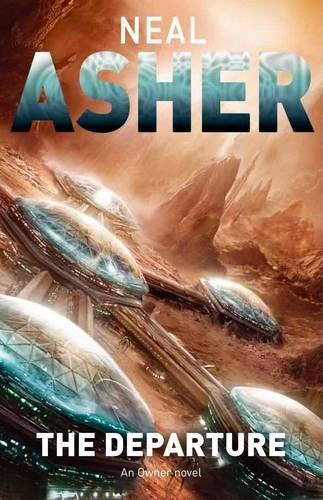The twenty-second-century world of Neal Asher’s The Departure (currently available in the U.K. only) is a totalitarian hellhole. Earth’s population has exploded to an unmanageable 18 billion, a heaving mass of humanity overseen by a nominally socialist government which naturally restricts much of the wealth and power to its own upper echelons. Human life is cheap, offensive weaponry is positively diabolical, and dark plans involving concentration camps and laser satellites are in the works to trim off a surplus 12 billion from the population—especially the ZAs, or Zero Assets, which basically includes anyone too poor or too troublesome to be worth saving. A Mars colony exists, but it’s hanging by a thread, and is about to be effectively abandoned by the Earth government.
[Read more]
Obviously the time is right for an Übermensch to rise and set matters to rights. He comes in the form of Alan Saul, a cybernetically enhanced genius with a pet AI named Janus that hacks its way through the internet—or GovNet as it’s now known—like the proverbial hot knife through butter. Saul is an amnesiac who woke up two years ago in a crate headed for incineration, but he has since overcome that initial setback and is on a mission: first, to find out who he was before he woke up in that crate; second, to tear down the Inspectorate, the government security division that got him there in the first place. Meanwhile, a woman named Varalia Delex is trying to save the Mars colony from what amounts to liquidation at the hands of a bureaucrat who will happily kill off anyone who stands in his way—and if they’re the only person who can repair the base machinery, he’s not intelligent enough to care.
The Departure is only the beginning of Asher’s Owner series, which one assumes will trace the continuing adventures of Alan Saul as he drags the kicking and screaming human race to Mars and perhaps even beyond the solar system itself. He and Varalia are obviously destined to meet and join forces, and there’s a strong hint that they are more closely related to one another than simply being random strangers with congruent, anti-government goals.
But that meeting and revelation will have to wait, along with the greater substance of Alan Saul’s story. The Departure reads like several hundred pages of preparation and is only moderately satisfying on its own. Here, Alan Saul is essentially a juggernaut, blazing his way across the overpopulated, decadent Earth like a wildfire, leaving chaos in his wake. He’s by far the most interesting and well-fleshed-out character, but that’s not really difficult in that most of the others are largely ciphers who exist simply to react to (or be killed by) him. Even Hannah Neumann, a scientist who knew and loved the original Alan Saul, is defined largely by her reactions to his extreme measures. She is his conscience incarnate, and little more.
Asher’s love of the gruesome kill—and there are many, many shootings, dismemberments, decapitations, asphyxiations, and other unclean deaths—is sometimes reminiscent of Iain M. Banks in a sadistic mood, but notably lacking is Banks’s sense of humour, irony, and flair for the absurd. Asher’s politics are less overt than Banks’s as well; the worldwide government of the future Earth is ostensibly socialist, but it’s the kind of heavy-handed totalitarian “socialism” that’s easy to hate no matter what one’s own political inclinations may be.
World-building is expressed in introductory paragraphs to each chapter, which read like the opening crawls from the beginning of the Star Wars prequels: “Throughout the early years of the twenty-first century, Internet blogs and news groups displaced the slow, moribund, and politically tribal newspapers. As internet technology became easier to use, TV news incorporated itselt into it to survive, thus also sliding out of political control…” Exposition is often awkwardly inserted into the dialogue, as when Varalia and her allies are plotting to asphyxiate a couple of guards on the Mars base:
“A higher level of CO2 helps the plants grow,” Kaskan whispered. “We keep it at just the right level to prevent anyone working there form getting asphyxiated—but that can be changed.” He reached up, operating a ball control to call up a menu, then touched the screen, shifting upwards a marker on a bar control, but Var reached over and caught hold of his hand.
“If they start suffocating they might fire their weapons,” she said.
Kaskan shook his head. “No, it’ll be gradual anoxia.” He nodded toward the windows. “They’ll start to feel tired, maybe a little ill and certainly a bit confused.”
There simply aren’t very many surprises or much suspense in The Departure. Saul is so clearly superior to everyone around him, and he makes such quick work of his enemies, that there’s almost no question that he’ll have achieved his goals by the novel’s end. And the big question—what will he do when he reaches the Mars base, when his freedom fighters meet up with Var’s?—remains unanswered; the chief enticement, perhaps, to buy the next book in the series.
Karin Kross lives and writes in Austin, TX. She can be found on the internet on Tumblr and Twitter.










